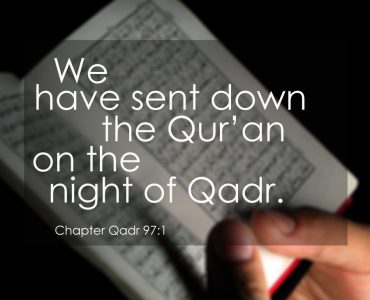DEFINITION
The word “shirk” is of a word root that means “partnership”.
Shirk is neither limited to polytheism nor is it the disbelief in the existence and unity of Allah. Everyone instinctively knows that the Creator, the Governor of the Universe is One (Quran 7:172, 29:61-63) even though He is called by different names among different groups of people in different languages. Shirk is associating partners with Allah, giving somebody else a share of something that belongs to Allah, which may be the ascription of some of Allah’s attributes to other beings, loving them as if you love Allah (Quran 2:165), seeking help from them, and listening to them unconditionally, thus becoming a servant to them.
According to classical Arabic dictionaries, to be a servant is to obey willingly, lovingly, and respectfully. [1] In this sense, people must be the servants of God only, since no one can serve two masters (Quran 39:29, Matthew 6:24).
FREE YOURSELF!
When we devote ourselves to God’s servitude, no other obstacle, benefit, or prospect of benefit can prevent us from fulfilling His commandments. We become only God’s servants, and that is the highest standard of freedom one can attain.
COMMITTING SHIRK IN THE PURSUIT OF OUR DESIRES
Instead, if we prioritize other things over God’s decrees, and disregard the way of life that God has prescribed for us while trying to obtain what we desire in the worldly life, then we become the servants of our desires. God describes such people in the Quran (25:43, 45:23) as “those who adopt their desires as their deities”. Adopting other deities besides God, by definition, is shirk.
Wealth, prestige, fame, systems of principles based on human opinion, and even the well-being of our loved ones may become our deities if we prefer devotion to achieving these goals over fulfilling God’s decrees. This seems to be the most common type of shirk that people commit in this era.
COMMITTING SHIRK FEARING OTHERS
If we violate God’s commandments or do not follow God’s rules out of fear of others, fear of poverty, fear of losing friends or worldly gains, etc., then it means we prioritize them over God, and commit shirk. Believers, rather than fearing losses in this life, must fear the greatest loss they may experience in the afterlife (Quran 9:24). God is the One who is worthy of being feared more than others (Quran 2:40-41, 3:28-30, 9:13).
COMMITTING SHIRK THROUGH INTERCESSION
There are also other forms of shirk where people adopt so-called “holy” beings as intercessors between God and themselves “to draw closer to God” (Quran 39:3). These people think that prophets, saints, scholars, or some “beloved servants” of God are closer to God than themselves, and ask for their intercession rather than directly invoking God (Quran 39:8). That is an erroneous way of thinking because God informs us that He is closer to us than our jugular veins/nerve endings[2] (Quran 50:16). Such people happen to ignore God’s omnipresence, and the fact that God is the One Who knows all their needs, grants them all the blessings, and saves them from all evil (Quran 6:63-64, 10:107).
The adoption of Jesus the Messiah as God and the thought of salvation through him is also the outcome of the opinion of intercession. Christians claim that Jesus will intercede for people and save them. Hence, the following questions come to mind:
Who is more merciful than God that people might even need his intercession for salvation? God is Beneficent and Merciful enough (Quran 1:2).
Who is more powerful than God that he might save people from God’s punishment? (Quran 6:17, 39:43-44). The answer is “No one”.
This is why intercession is not the correct way of serving God. We must invoke, pray, and ask for forgiveness from God directly (Quran 26:23). Abraham (PBUH), the father of nations, was an upright servant of God, and he had said:
“Behold, I have turned my face directly to Him Who brought the heavens and the earth into being, and I am not of those who ascribe divinity to anything besides Him.” (Quran 6:79)
IDOLATRY
Adopting intercessors is just like adopting minor deities between God and you, which ends in serving those deities rather than God.
This was what ancient people did: They attributed God’s certain attributes to some imaginary minor deities, such as “the god of fertility”, “the god of love”, “the god of the sun”, “the god of the underworld”, etc. (Quran 6:74, 7:138, 20:88). They named them and created images of them, thus forming idols. This is the essence of idolatry, and idolatry is shirk.
REPENTANCE BEFORE IT IS LATE
We must remember that shirk is the greatest sin that God will never forgive in the afterlife unless the person repents and amends themself before death approaches (an-Nisa 4:48, 116). If we notice that we have committed any form of shirk, we must change our behavior and ask for forgiveness from God before it’s too late.
[1] Maqayis al-Lugha, Mufradat fi Gharib al-Quran
[2] The expression “habl’ul- wareed” (حبل الوريد) in the verse is commonly translated as “jugular vein”. However, the word that means “jugular vein” is the word “wateen (الَوتين)” in Surah Al-Haqqa 69/46. The literal translation of the expression “Habl’ul wareed” is “the thread that reaches”. Since we cannot call something through which liquid flows a “thread (حبل)”, the meaning of the word cannot be vein. The only meaning that we can assign to Habl’ul- wareed is the fibers of the nervous system, which allows the information from the senses to reach the brain and the information from the brain to reach the organs. Allah (swt) has that information recorded before putting it into practice. The relevant verse is as follows: “There is not a single thing that occurs in the earth or in yourselves that is not recorded in a book before We create it as a separate being. This is easy for Allah (Hadeed 57:22). Allah is closer to the person than the nerve endings, as He is aware of this information before it reaches the nerves.








Add comment